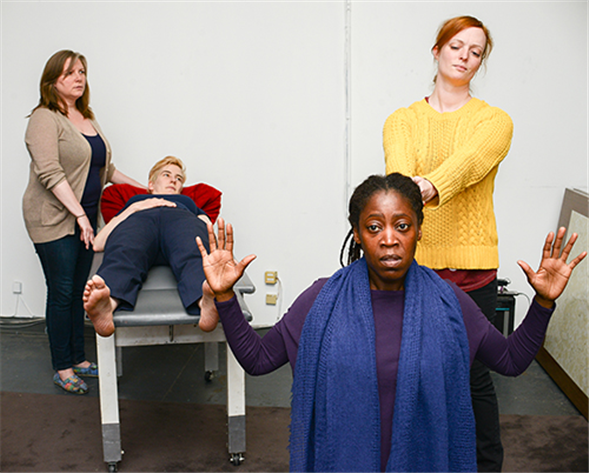Translate Page

In The Blueprint Project, writers riff on the same idea
---
Have you ever watched a play and thought, "That's now how I would've told the story?" This week, Gideon Production is encouraging playwrights to think just that. In The Blueprint Project: First Contact, four writers have been called on to create their own short plays based on the same synopsis.
Playwrights Johnna Adams, J. Holtham, Dan Kois and Mariah MacCarthy all received the following plot outline: "Two characters (call them A and B) are trying to establish 'first contact.' A third person (C) enters the picture. Conflict ensues, and then a fourth person (D) appears. At the end, one of the characters leaves with D."
Beyond that structure, anything goes. So the works, while sharing the same basic story, differ in tone, genre, and interpretations of the evocative phrase "first contact." For example, while Adams describes her play Advances as a "popcorn-chewing action thriller" with no aliens in sight, Holtham took a more traditional approach to science fiction with The Great Silence, in which three scientists trying to figure out how to communicate with distant beings.
The four short plays will be presented as an anthology May 21-25 at the Secret Theatre in Long Island City. Inspired by Blueprint Project, TDF Stages asked Adams and Holtham the same set of questions. The result, like the plays themselves, share similar thoughts and sentiments, but they also diverge in many ways.
---
What was the first thing that popped into your head when you read the prompt?
Holtham: The first thing that popped into my head is the phrase that I use, which is, "the great silence," wondering why we haven't heard from any other intelligent species throughout the universe. And that sense of isolation and heartbreak… the synopsis has a part about the two people having been a couple, so there's a lot of silence that goes into breaking up with someone, and a lot of that pain. A lot of, I'm sending messages out to the void that is you.
Adams: I had absolutely no idea what to do with it! [The prompt] lendt itself to an alien encounter, but I didn't want to do that. I did a different science-fiction take. I didn't want to be predictable. I went for a soldier, a woman soldier who had lost all of her limbs, in a futuristic dystopia. Once I got started, I forgot the rest of the blueprint and had to go back! Towards the end, I went off blueprint a little bit. laughs]
What does the phrase "first contact" mean to you?
Holtham: I went the literal route, which is first contact with an alien species. I like the topic of first contact. I've been reading a lot about it on my own, about the search for intelligent life and extraterrestrial intelligence, and the difficulty of it. There could be thousands of civilization as advanced as we are, and there's no way we can talk to them.
And so that's where the playwright part of me comes in, because it really speaks to a fundamental loneliness about life and about knowing anything about anyone else. The play builds on the difficulty of communicating with anyone.
Adams: I originally interpreted it as an alien. What I ended up doing in my piece is the first encounter between a woman and, it's not a clone really, but a newly created body with her own mind imprinted on it. Kind of this manufactured creature that is really her duplicate. And it's their first encounter, their first contact with one another.
Without knowing who wrote it, how will viewers know that it's your play?
Holtham: They have a program so hopefully they will know! The play does have my own style and the structure of jokes. It's just the voice. We're such distinctive voices that ours will come straight through. Funny, and sad---someone once described my work as the hug that almost doesn't come. That's about right.
Adams: There is definitely psychological drama going on. And my plays tend to have a lot of grief in them. It's a soldier who's basically giving up her life for a clone self to emerge, and she's dying. That is the closest to what you see in one of my other plays, that kind of psychological acceptance of some limitations.
It's also for four women. There's not many "hard sci-fi" female plays. I think that's something uniquely me. I like seeing actresses do things they haven't done before.
What's the value in something like Blueprint Project?
Holtham: You get to see four very different imaginations, four very different views of the worlds and ideas. And they're such great voices. And it's exciting.
Adams: Just the power of imagination. What's really fascinating to me is you really get to hear a writer's voice, and a writer's love of storytelling coming out in a unique way. I think that's really a unique experience, to hear something without judging whether or not it was a worthy idea to begin with. Instead you can relax and enjoy the writing of it. That's what I think I'm looking forward to---not having my play judged on whether or not it's a great plot or idea. Just having fun with some characters and a story that was suggested to me.
---
Diep Tran is a writer and editor based in New York City</i>
Photo by Deborah Alexander